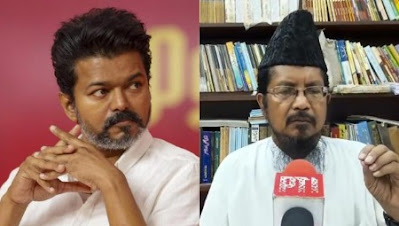Fatwa Issued Against Actor Vijay: The Controversy Behind His Iftar Party
Introduction
The recent fatwa issued against Tamil Nadu actor-politician Thalapathy Vijay has stirred a massive controversy, especially concerning the Muslim community's sentiments. The fatwa was issued by Maulana Shahabuddin Razvi, a prominent Sunni cleric from Bareilly, Uttar Pradesh, who accused Vijay of anti-Islamic behavior and criticized his political opportunism. The fatwa specifically targets Vijay's participation in an Iftar party, where alcoholics and gamblers were allegedly invited, causing an uproar among many Muslims. This article will explore the details of the fatwa, the Iftar party, and the political ramifications for Vijay.
 |
| Actor Vijay, seen here after his iftar party, is facing a fatwa from a Sunni Muslim cleric over the presence of 'alcoholics' at the event. |
#FatwaOnVijay
Maulana Razvi also mentioned that Vijay had used his film career to portray Muslims negatively, particularly in his film The Beast, which he claimed linked Muslims to terrorism and militancy. According to Razvi, Vijay's intentions were now clear: after trying to appease Muslims for votes, he was now attempting to use them as a political tool. This sharp criticism reflects the ongoing tension between celebrities and religious leaders regarding the use of religious sentiments for political gain.
#VijayIftarRow
Reports claimed that some of the guests were “drunkards and troublemakers,” people who had no business attending an Iftar event, let alone engaging in religious observances like prayer. The presence of these individuals at an event meant to celebrate the sanctity of Ramadan was deemed offensive and insulting by many attendees, leading to widespread criticism.
In addition, Vijay’s participation in the evening namaz (prayers) and his symbolic gesture of wearing a skullcap raised questions among some members of the community. While the gesture was seen by some as an attempt to align himself with Muslim traditions, others viewed it as a shallow political move. This event highlights the delicate balance celebrities and politicians must strike when engaging with religious communities, particularly when it comes to cultural and religious sensitivity.
#TVKDramaExposed
Critics argue that Vijay is trying to use his film fame to gain political leverage, and his recent Iftar event, which many perceive as an attempt at appeasement, only adds fuel to this argument. Some see it as a desperate move to appeal to the Muslim vote bank in Tamil Nadu, where religious sentiments play a significant role in electoral politics.
Opposition leaders, such as former Tamil Nadu BJP state unit chief K Annamalai, have also weighed in on the controversy. Annamalai criticized Vijay for his actions, pointing out the hypocrisy of his public support for Muslims when his films, like Master, have previously portrayed Muslims negatively. He questioned Vijay’s integrity, calling his Iftar gesture an empty political stunt rather than a genuine religious commitment.
#IftarNotForAlcoholics
Syed Kous, the treasurer of the Tamil Nadu Sunnat Jamath, stated that Vijay’s invitation of “drunkards” to an Iftar party was an insult to Muslims. The community filed a police complaint alleging that the Iftar party was a poorly managed event that failed to honor the religious significance of Ramadan.
This incident has sparked discussions about the role of celebrities in political and religious matters, especially when their actions cross cultural and religious boundaries. The controversy highlights how sensitive religious observances are and how easy it is for public figures to alienate entire communities when they fail to respect these practices.
The controversy also emphasizes the power of religious leaders in influencing public opinion and the role that cultural sensitivity plays in political campaigns. As Vijay navigates the fallout from this controversy, his future in both politics and cinema will be under close scrutiny.
Comments
Post a Comment